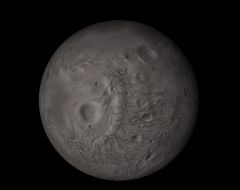Difference between revisions of "Cressida"
m (Arvil moved page User:Arvil to Cressida: Move to article page.) |
(Added category.) |
||
| Line 70: | Line 70: | ||
[[Category:Articles]] | [[Category:Articles]] | ||
[[Category:Celestial bodies]] | [[Category:Celestial bodies]] | ||
| + | [[Category:Solar System]] | ||
[[Category:Natural satellites]] | [[Category:Natural satellites]] | ||
[[Category:Satellites of Uranus]] | [[Category:Satellites of Uranus]] | ||
{{Nsat-Stub}} | {{Nsat-Stub}} | ||
Revision as of 03:27, 12 September 2024
Cressida (Uranus IX, S/1986 U 3) is one of the inner satellites of Uranus. It was discovered by the Voyager2 spacecraft in January 1986. It is named after the Trojan daughter of Calchas in Shakespeare's Troilus and Cressida.
Portia in Orbiter
Cressida was first introduced into Orbiter with the add-on uranus.zip in November 2002.
| Add-on | Source | Version | Author | Type | Release Date | Compatibility | Wiki article |
|---|---|---|---|---|---|---|---|
| Uranus | AVSIM | Rolf Keibel | Scenery | 5 November 2002 | |||
Cressida imaged by the Voyager 2 spacecraft in 1986,
from Wikimedia Commons
| Uranus's natural satellites |
|---|
| Named Satellites:
Ariel | Belinda | Bianca | Caliban | Cordelia | Cressida | Cupid | Desdemona | Ferdinand | Francisco | Juliet | Mab | Margaret | Miranda | Oberon | Ophelia | Perdita | Portia | Prospero | Puck | Rosalind | Setebos | Stephano | Sycorax | Titania | Trinculo | Umbriel Numbered Satellites: |
| See also: Pronunciation key | rings of Uranus |
| edit The Solar System | |
|---|---|
| Central star |
Sun (Sol) |
| Planets |
Mercury - Venus - Earth - Mars - Jupiter - Saturn - Uranus - Neptune |
| Natural satellites |
Moon - Phobos - Deimos - Io - Europa - Ganymede - Titan - more... |
| Add-ons |
Planets - Dwarf Planets - Small objects - Natural satellites - Alternative star systems |
 | This natural satellite related article is a stub. You can help Orbiterwiki by expanding it.
|



